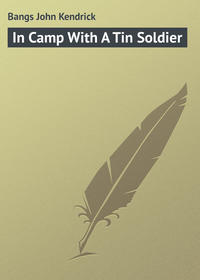 полная версия
полная версияA House-Boat on the Styx

John Kendrick Bangs
A House-Boat on the Styx
CHAPTER I: CHARON MAKES A DISCOVERY
Charon, the Ferryman of renown, was cruising slowly along the Styx one pleasant Friday morning not long ago, and as he paddled idly on he chuckled mildly to himself as he thought of the monopoly in ferriage which in the course of years he had managed to build up.
“It’s a great thing,” he said, with a smirk of satisfaction—“it’s a great thing to be the go-between between two states of being; to have the exclusive franchise to export and import shades from one state to the other, and withal to have had as clean a record as mine has been. Valuable as is my franchise, I never corrupted a public official in my life, and—”
Here Charon stopped his soliloquy and his boat simultaneously. As he rounded one of the many turns in the river a singular object met his gaze, and one, too, that filled him with misgiving. It was another craft, and that was a thing not to be tolerated. Had he, Charon, owned the exclusive right of way on the Styx all these years to have it disputed here in the closing decade of the Nineteenth Century? Had not he dealt satisfactorily with all, whether it was in the line of ferriage or in the providing of boats for pleasure-trips up the river? Had he not received expressions of satisfaction, indeed, from the most exclusive families of Hades with the very select series of picnics he had given at Charon’s Glen Island? No wonder, then, that the queer-looking boat that met his gaze, moored in a shady nook on the dark side of the river, filled him with dismay.
“Blow me for a landlubber if I like that!” he said, in a hardly audible whisper. “And shiver my timbers if I don’t find out what she’s there for. If anybody thinks he can run an opposition line to mine on this river he’s mightily mistaken. If it comes to competition, I can carry shades for nothing and still quaff the B. & G. yellow-label benzine three times a day without experiencing a financial panic. I’ll show ’em a thing or two if they attempt to rival me. And what a boat! It looks for all the world like a Florentine barn on a canal-boat.”
Charon paddled up to the side of the craft, and, standing up in the middle of his boat, cried out,
“Ship ahoy!”
There was no answer, and the Ferryman hailed her again. Receiving no response to his second call, he resolved to investigate for himself; so, fastening his own boat to the stern-post of the stranger, he clambered on board. If he was astonished as he sat in his ferry-boat, he was paralyzed when he cast his eye over the unwelcome vessel he had boarded. He stood for at least two minutes rooted to the spot. His eye swept over a long, broad deck, the polish of which resembled that of a ball-room floor. Amidships, running from three-quarters aft to three-quarters forward, stood a structure that in its lines resembled, as Charon had intimated, a barn, designed by an architect enamoured of Florentine simplicity; but in its construction the richest of woods had been used, and in its interior arrangement and adornment nothing more palatial could be conceived.
“What’s the blooming thing for?” said Charon, more dismayed than ever. “If they start another line with a craft like this, I’m very much afraid I’m done for after all. I wouldn’t take a boat like mine myself if there was a floating palace like this going the same way. I’ll have to see the Commissioners about this, and find out what it all means. I suppose it’ll cost me a pretty penny, too, confound them!”
A prey to these unhappy reflections, Charon investigated further, and the more he saw the less he liked it. He was about to encounter opposition, and an opposition which was apparently backed by persons of great wealth—perhaps the Commissioners themselves. It was a consoling thought that he had saved enough money in the course of his career to enable him to live in comfort all his days, but this was not really what Charon was after. He wished to acquire enough to retire and become one of the smart set. It had been done in that section of the universe which lay on the bright side of the Styx, why not, therefore, on the other, he asked.
“I’m pretty well connected even if I am a boatman,” he had been known to say. “With Chaos for a grandfather, and Erebus and Nox for parents, I’ve just as good blood in my veins as anybody in Hades. The Noxes are a mighty fine family, not as bright as the Days, but older; and we’re poor—that’s it, poor—and it’s money makes caste these days. If I had millions, and owned a railroad, they’d call me a yacht-owner. As I haven’t, I’m only a boatman. Bah! Wait and see! I’ll be giving swell functions myself some day, and these upstarts will be on their knees before me begging to be asked. Then I’ll get up a little aristocracy of my own, and I won’t let a soul into it whose name isn’t mentioned in the Grecian mythologies. Mention in Burke’s peerage and the Élite directories of America won’t admit anybody to Commodore Charon’s house unless there’s some other mighty good reason for it.”
Foreseeing an unhappy ending to all his hopes, the old man clambered sadly back into his ancient vessel and paddled off into the darkness. Some hours later, returning with a large company of new arrivals, while counting up the profits of the day Charon again caught sight of the new craft, and saw that it was brilliantly lighted and thronged with the most famous citizens of the Erebean country. Up in the bow was a spirit band discoursing music of the sweetest sort. Merry peals of laughter rang out over the dark waters of the Styx. The clink of glasses and the popping of corks punctuated the music with a frequency which would have delighted the soul of the most ardent lover of commas, all of which so overpowered the grand master boatman of the Stygian Ferry Company that he dropped three oboli and an American dime, which he carried as a pocket-piece, overboard. This, of course, added to his woe; but it was forgotten in an instant, for some one on the new boat had turned a search-light directly upon Charon himself, and simultaneously hailed the master of the ferry-boat.
“Charon!” cried the shade in charge of the light. “Charon, ahoy!”
“Ahoy yourself!” returned the old man, paddling his craft close up to the stranger. “What do you want?”
“You,” said the shade. “The house committee want to see you right away.”
“What for?” asked Charon, cautiously.
“I’m sure I don’t know. I’m only a member of the club, and house committees never let mere members know anything about their plans. All I know is that you are wanted,” said the other.
“Who are the house committee?” queried the Ferryman.
“Sir Walter Raleigh, Cassius, Demosthenes, Blackstone, Doctor Johnson, and Confucius,” replied the shade.
“Tell ’em I’ll be back in an hour,” said Charon, pushing off. “I’ve got a cargo of shades on board consigned to various places up the river. I’ve promised to get ’em all through to-night, but I’ll put on a couple of extra paddles—two of the new arrivals are working their passage this trip—and it won’t take as long as usual. What boat is this, anyhow?”
“The Nancy Nox, of Erebus.”
“Thunder!” cried Charon, as he pushed off and proceeded on his way up the river. “Named after my mother! Perhaps it’ll come out all right yet.”
More hopeful of mood, Charon, aided by the two dead-head passengers, soon got through with his evening’s work, and in less than an hour was back seeking admittance, as requested, to the company of Sir Walter Raleigh and his fellow-members on the house committee. He was received by these worthies with considerable effusiveness, considering his position in society, and it warmed the cockles of his aged heart to note that Sir Walter, who had always been rather distant to him since he had carelessly upset that worthy and Queen Elizabeth in the middle of the Styx far back in the last century, permitted him to shake three fingers of his left hand when he entered the committee-room.
“How do you do, Charon?” said Sir Walter, affably. “We are very glad to see you.”
“Thank you, kindly, Sir Walter,” said the boatman. “I’m glad to hear those words, your honor, for I’ve been feeling very bad since I had the misfortune to drop your Excellency and her Majesty overboard. I never knew how it happened, sir, but happen it did, and but for her Majesty’s kind assistance it might have been the worse for us. Eh, Sir Walter?”
The knight shook his head menacingly at Charon. Hitherto he had managed to keep it a secret that the Queen had rescued him from drowning upon that occasion by swimming ashore herself first and throwing Sir Walter her ruff as soon as she landed, which he had used as a life-preserver.
“’Sh!” he said, sotto voce. “Don’t say anything about that, my man.”
“Very well, Sir Walter, I won’t,” said the boatman; but he made a mental note of the knight’s agitation, and perceived a means by which that illustrious courtier could be made useful to him in his scheming for social advancement.
“I understood you had something to say to me,” said Charon, after he had greeted the others.
“We have,” said Sir Walter. “We want you to assume command of this boat.”
The old fellow’s eyes lighted up with pleasure.
“You want a captain, eh?” he said.
“No,” said Confucius, tapping the table with a diamond-studded chop-stick. “No. We want a—er—what the deuce is it they call the functionary, Cassius?”
“Senator, I think,” said Cassius.
Demosthenes gave a loud laugh.
“Your mind is still running on Senatorships, my dear Cassius. That is quite evident,” he said. “This is not one of them, however. The title we wish Charon to assume is neither Captain nor Senator; it is Janitor.”
“What’s that?” asked Charon, a little disappointed. “What does a Janitor have to do?”
“He has to look after things in the house,” explained Sir Walter. “He’s a sort of proprietor by proxy. We want you to take charge of the house, and see to it that the boat is kept shipshape.”
“Where is the house?” queried the astonished boatman.
“This is it,” said Sir Walter. “This is the house, and the boat too. In fact, it is a house-boat.”
“Then it isn’t a new-fangled scheme to drive me out of business?” said Charon, warily.
“Not at all,” returned Sir Walter. “It’s a new-fangled scheme to set you up in business. We’ll pay you a large salary, and there won’t be much to do. You are the best man for the place, because, while you don’t know much about houses, you do know a great deal about boats, and the boat part is the most important part of a house-boat. If the boat sinks, you can’t save the house; but if the house burns, you may be able to save the boat. See?”
“I think I do, sir,” said Charon.
“Another reason why we want to employ you for Janitor,” said Confucius, “is that our club wants to be in direct communication with both sides of the Styx; and we think you as Janitor would be able to make better arrangements for transportation with yourself as boatman, than some other man as Janitor could make with you.”
“Spoken like a sage,” said Demosthenes.
“Furthermore,” said Cassius, “occasionally we shall want to have this boat towed up or down the river, according to the house committee’s pleasure, and we think it would be well to have a Janitor who has some influence with the towing company which you represent.”
“Can’t this boat be moved without towing?” asked Charon.
“No,” said Cassius.
“And I’m the only man who can tow it, eh?”
“You are,” said Blackstone. “Worse luck.”
“And you want me to be Janitor on a salary of what?”
“A hundred oboli a month,” said Sir Walter, uneasily.
“Very well, gentlemen,” said Charon. “I’ll accept the office on a salary of two hundred oboli a month, with Saturdays off.”
The committee went into executive session for five minutes, and on their return informed Charon that in behalf of the Associated Shades they accepted his offer.
“In behalf of what?” the old man asked.
“The Associated Shades,” said Sir Walter. “The swellest organization in Hades, whose new house-boat you are now on board of. When shall you be ready to begin work?”
“Right away,” said Charon, noting by the clock that it was the hour of midnight. “I’ll start in right away, and as it is now Saturday morning, I’ll begin by taking my day off.”
CHAPTER II: A DISPUTED AUTHORSHIP
“How are you, Charon?” said Shakespeare, as the Janitor assisted him on board. “Any one here to-night?”
“Yes, sir,” said Charon. “Lord Bacon is up in the library, and Doctor Johnson is down in the billiard-room, playing pool with Nero.”
“Ha-ha!” laughed Shakespeare. “Pool, eh? Does Nero play pool?”
“Not as well as he does the fiddle, sir,” said the Janitor, with a twinkle in his eye.
Shakespeare entered the house and tossed up an obolus. “Heads—Bacon; tails—pool with Nero and Johnson,” he said.
The coin came down with heads up, and Shakespeare went into the pool-room, just to show the Fates that he didn’t care a tuppence for their verdict as registered through the obolus. It was a peculiar custom of Shakespeare’s to toss up a coin to decide questions of little consequence, and then do the thing the coin decided he should not do. It showed, in Shakespeare’s estimation, his entire independence of those dull persons who supposed that in them was centred the destiny of all mankind. The Fates, however, only smiled at these little acts of rebellion, and it was common gossip in Erebus that one of the trio had told the Furies that they had observed Shakespeare’s tendency to kick over the traces, and always acted accordingly. They never let the coin fall so as to decide a question the way they wanted it, so that unwittingly the great dramatist did their will after all. It was a part of their plan that upon this occasion Shakespeare should play pool with Doctor Johnson and the Emperor Nero, and hence it was that the coin bade him repair to the library and chat with Lord Bacon.
“Hullo, William,” said the Doctor, pocketing three balls on the break. “How’s our little Swanlet of Avon this afternoon?”
“Worn out,” Shakespeare replied. “I’ve been hard at work on a play this morning, and I’m tired.”
“All work and no play makes Jack a dull boy,” said Nero, grinning broadly.
“You are a bright spirit,” said Shakespeare, with a sigh. “I wish I had thought to work you up into a tragedy.”
“I’ve often wondered why you didn’t,” said Doctor Johnson. “He’d have made a superb tragedy, Nero would. I don’t believe there was any kind of a crime he left uncommitted. Was there, Emperor?”
“Yes. I never wrote an English dictionary,” returned the Emperor, dryly. “I’ve murdered everything but English, though.”
“I could have made a fine tragedy out of you,” said Shakespeare. “Just think what a dreadful climax for a tragedy it would be, Johnson, to have Nero, as the curtain fell, playing a violin solo.”
“Pretty good,” returned the Doctor. “But what’s the use of killing off your audience that way? It’s better business to let ’em live, I say. Suppose Nero gave a London audience that little musicale he provided at Queen Elizabeth’s Wednesday night. How many purely mortal beings, do you think, would have come out alive?”
“Not one,” said Shakespeare. “I was mighty glad that night that we were an immortal band. If it had been possible to kill us we’d have died then and there.”
“That’s all right,” said Nero, with a significant shake of his head. “As my friend Bacon makes Ingo say, ‘Beware, my lord, of jealousy.’ You never could play a garden hose, much less a fiddle.”
“What do you mean my attributing those words to Bacon?” demanded Shakespeare, getting red in the face.
“Oh, come now, William,” remonstrated Nero. “It’s all right to pull the wool over the eyes of the mortals. That’s what they’re there for; but as for us—we’re all in the secret here. What’s the use of putting on nonsense with us?”
“We’ll see in a minute what the use is,” retorted the Avonian. “We’ll have Bacon down here.” Here he touched an electric button, and Charon came in answer.
“Charon, bring Doctor Johnson the usual glass of ale. Get some ice for the Emperor, and ask Lord Bacon to step down here a minute.”
“I don’t want any ice,” said Nero.
“Not now,” retorted Shakespeare, “but you will in a few minutes. When we have finished with you, you’ll want an iceberg. I’m getting tired of this idiotic talk about not having written my own works. There’s one thing about Nero’s music that I’ve never said, because I haven’t wanted to hurt his feelings, but since he has chosen to cast aspersions upon my honesty I haven’t any hesitation in saying it now. I believe it was one of his fiddlings that sent Nature into convulsions and caused the destruction of Pompeii—so there! Put that on your music rack and fiddle it, my little Emperor.”
Nero’s face grew purple with anger, and if Shakespeare had been anything but a shade he would have fared ill, for the enraged Roman, poising his cue on high as though it were a lance, hurled it at the impertinent dramatist with all his strength, and with such accuracy of aim withal that it pierced the spot beneath which in life the heart of Shakespeare used to beat.
“Good shot,” said Doctor Johnson, nonchalantly. “If you had been a mortal, William, it would have been the end of you.”
“You can’t kill me,” said Shakespeare, shrugging his shoulders. “I know seven dozen actors in the United States who are trying to do it, but they can’t. I wish they’d try to kill a critic once in a while instead of me, though,” he added. “I went over to Boston one night last week, and, unknown to anybody, I waylaid a fellow who was to play Hamlet that night. I drugged him, and went to the theatre and played the part myself. It was the coldest house you ever saw in your life. When the audience did applaud, it sounded like an ice-man chopping up ice with a small pick. Several times I looked up at the galleries to see if there were not icicles growing on them, it was so cold. Well, I did the best could with the part, and next morning watched curiously for the criticisms.”
“Favorable?” asked the Doctor.
“They all dismissed me with a line,” said the dramatist. “Said my conception of the part was not Shakespearian. And that’s criticism!”
“No,” said the shade of Emerson, which had strolled in while Shakespeare was talking, “that isn’t criticism; that’s Boston.”
“Who discovered Boston, anyhow?” asked Doctor Johnson. “It wasn’t Columbus, was it?”
“Oh no,” said Emerson. “Old Governor Winthrop is to blame for that. When he settled at Charlestown he saw the old Indian town of Shawmut across the Charles.”
“And Shawmut was the Boston microbe, was it?” asked Johnson.
“Yes,” said Emerson.
“Spelt with a P, I suppose?” said Shakespeare. “P-S-H-A-W, Pshaw, M-U-T, mut, Pshawmut, so called because the inhabitants are always muttering pshaw. Eh?”
“Pretty good,” said Johnson. “I wish I’d said that.”
“Well, tell Boswell,” said Shakespeare. “He’ll make you say it, and it’ll be all the same in a hundred years.”
Lord Bacon, accompanied by Charon and the ice for Nero and the ale for Doctor Johnson, appeared as Shakespeare spoke. The philosopher bowed stiffly at Doctor Johnson, as though he hardly approved of him, extended his left hand to Shakespeare, and stared coldly at Nero.
“Did you send for me, William?” he asked, languidly.
“I did,” said Shakespeare. “I sent for you because this imperial violinist here says that you wrote Othello.”
“What nonsense,” said Bacon. “The only plays of yours I wrote were Ham—”
“Sh!” said Shakespeare, shaking his head madly. “Hush. Nobody’s said anything about that. This is purely a discussion of Othello.”
“The fiddling ex-Emperor Nero,” said Bacon, loudly enough to be heard all about the room, “is mistaken when he attributes Othello to me.”
“Aha, Master Nero!” cried Shakespeare triumphantly. “What did I tell you?”
“Then I erred, that is all,” said Nero. “And I apologize. But really, my Lord,” he added, addressing Bacon, “I fancied I detected your fine Italian hand in that.”
“No. I had nothing to do with the Othello,” said Bacon. “I never really knew who wrote it.”
“Never mind about that,” whispered Shakespeare. “You’ve said enough.”
“That’s good too,” said Nero, with a chuckle. “Shakespeare here claims it as his own.”
Bacon smiled and nodded approvingly at the blushing Avonian.
“Will always was having his little joke,” he said. “Eh, Will? How we fooled ’em on Hamlet, eh, my boy? Ha-ha-ha! It was the greatest joke of the century.”
“Well, the laugh is on you,” said Doctor Johnson. “If you wrote Hamlet and didn’t have the sense to acknowledge it, you present to my mind a closer resemblance to Simple Simon than to Socrates. For my part, I don’t believe you did write it, and I do believe that Shakespeare did. I can tell that by the spelling in the original edition.”
“Shakespeare was my stenographer, gentlemen,” said Lord Bacon. “If you want to know the whole truth, he did write Hamlet, literally. But it was at my dictation.”
“I deny it,” said Shakespeare. “I admit you gave me a suggestion now and then so as to keep it dull and heavy in spots, so that it would seem more like a real tragedy than a comedy punctuated with deaths, but beyond that you had nothing to do with it.”
“I side with Shakespeare,” put in Emerson. “I’ve seen his autographs, and no sane person would employ a man who wrote such a villanously bad hand as an amanuensis. It’s no use, Bacon, we know a thing or two. I’m a New-Englander, I am.”
“Well,” said Bacon, shrugging his shoulders as though the results of the controversy were immaterial to him, “have it so if you please. There isn’t any money in Shakespeare these days, so what’s the use of quarrelling? I wrote Hamlet, and Shakespeare knows it. Others know it. Ah, here comes Sir Walter Raleigh. We’ll leave it to him. He was cognizant of the whole affair.”
“I leave it to nobody,” said Shakespeare, sulkily.
“What’s the trouble?” asked Raleigh, sauntering up and taking a chair under the cue-rack. “Talking politics?”
“Not we,” said Bacon. “It’s the old question about the authorship of Hamlet. Will, as usual, claims it for himself. He’ll be saying he wrote Genesis next.”
“Well, what if he does?” laughed Raleigh. “We all know Will and his droll ways.”
“No doubt,” put in Nero. “But the question of Hamlet always excites him so that we’d like to have it settled once and for all as to who wrote it. Bacon says you know.”
“I do,” said Raleigh.
“Then settle it once and for all,” said Bacon. “I’m rather tired of the discussion myself.”
“Shall I tell ’em, Shakespeare?” asked Raleigh.
“It’s immaterial to me,” said Shakespeare, airily. “If you wish—only tell the truth.”
“Very well,” said Raleigh, lighting a cigar. “I’m not ashamed of it. I wrote the thing myself.”
There was a roar of laughter which, when it subsided, found Shakespeare rapidly disappearing through the door, while all the others in the room ordered various beverages at the expense of Lord Bacon.
CHAPTER III: WASHINGTON GIVES A DINNER
It was Washington’s Birthday, and the gentleman who had the pleasure of being Father of his Country decided to celebrate it at the Associated Shades’ floating palace on the Styx, as the Elysium Weekly Gossip, “a Journal of Society,” called it, by giving a dinner to a select number of friends. Among the invited guests were Baron Munchausen, Doctor Johnson, Confucius, Napoleon Bonaparte, Diogenes, and Ptolemy. Boswell was also present, but not as a guest. He had a table off to one side all to himself, and upon it there were no china plates, silver spoons, knives, forks, and dishes of fruit, but pads, pens, and ink in great quantity. It was evident that Boswell’s reportorial duties did not end with his labors in the mundane sphere.
The dinner was set down to begin at seven o’clock, so that the guests, as was proper, sauntered slowly in between that hour and eight. The menu was particularly choice, the shades of countless canvas-back ducks, terrapin, and sheep having been called into requisition, and cooked by no less a person than Brillat-Savarin, in the hottest oven he could find in the famous cooking establishment superintended by the government. Washington was on hand early, sampling the olives and the celery and the wines, and giving to Charon final instructions as to the manner in which he wished things served.









